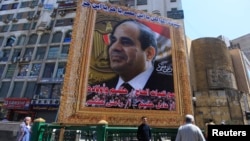Egypt has announced the dates for the first round of voting for a new president.
Egypt's election commission says voting will be held on May 26 and 27, with results expected in early June.
The commission said Sunday if a second round is necessary, it would be held in mid-June with results expected June 26.
The commission said candidate nominations will open Monday and will be taken until April 20. A three-week campaign period is slated to start in early May.
Abdel Fattah el-Sissi, the general who toppled Egypt's first freely-elected President Mohamed Morsi in July after one year in office, is widely expected to win the election. He enjoys solid support from state-run and privately-owned media.
The commission's announcement comes a few days after military-backed Sissi resigned and announced on state television, while in military uniform, that he would run for president.
So far, the only other candidate for the presidency is leftist-Nasserite politician Hamdeen Sabahi, who came third in the 2012 election won by Morsi. Several would-be candidates, including Khaled Ali and Abdel-Moneim Abul Fotouh, have decided to boycott, claiming unfair competition. They say it's impossible to have free elections when authorities stifle dissent and arrest critics of the state.
Egypt is bitterly divided over Morsi's ouster, but el-Sissi has garnered wide support for his role in it.
U.S. officials say they are focusing now on the freedom of Egypt's electoral process.
"
It is up to the people of Egypt to determine their future. And we have also repeatedly said that, as the people of Egypt go to the polls to do that, it must be in a climate that's free from intimidation where people feel they can vote for and support whatever party and whatever candidate they want to," said Deputy State Department Spokeswoman Marie Harf. "... we have raised concerns with the interim Egyptian government about the ability for citizens to freely express their opinions."
Especially as most of the recent U.S. human rights concerns followed el-Sissi's toppling of Egypt's first democratically-elected government - leaving Washington in what former U.S. ambassador Adam Ereli calls an awkward position.
"The good side: they're running things. The bad side: they're repressing a lot of dissent. And not necessarily disloyal dissent but any dissent. That bothers President Obama and his administration. It really does," said Ereli.
Meanwhile, clashes erupted in Cairo and other ciries Sunday between police and university students who have been demanding the release of their colleagues from jails. The students are also protesting the mass death sentences against hundreds of Morsi’s supporters and Brotherhood members last week.
Egypt was ruled by civilan-dressed generals since the 1952 coup that toppled King Farouk untill July 2012, when the country elected its first civilian presidient. A year later, Sissi overthrew him after large protests against his rule.
Egypt's election commission says voting will be held on May 26 and 27, with results expected in early June.
The commission said Sunday if a second round is necessary, it would be held in mid-June with results expected June 26.
The commission said candidate nominations will open Monday and will be taken until April 20. A three-week campaign period is slated to start in early May.
Abdel Fattah el-Sissi, the general who toppled Egypt's first freely-elected President Mohamed Morsi in July after one year in office, is widely expected to win the election. He enjoys solid support from state-run and privately-owned media.
The commission's announcement comes a few days after military-backed Sissi resigned and announced on state television, while in military uniform, that he would run for president.
So far, the only other candidate for the presidency is leftist-Nasserite politician Hamdeen Sabahi, who came third in the 2012 election won by Morsi. Several would-be candidates, including Khaled Ali and Abdel-Moneim Abul Fotouh, have decided to boycott, claiming unfair competition. They say it's impossible to have free elections when authorities stifle dissent and arrest critics of the state.
Egypt is bitterly divided over Morsi's ouster, but el-Sissi has garnered wide support for his role in it.
U.S. officials say they are focusing now on the freedom of Egypt's electoral process.
"
Abdel Fattah al-Sissi
Abdel Fattah al-Sissi- Born in Cairo November 19, 1954
- Graduated from Cairo's Military Academy in 1977
- Trained at the U.S. War College in Pennsylvania 2006
- Promoted to commander of Egypt's Western Front
- Headed the military intelligence under Mubarak
- Appointed army chief and defense minister by Morsi in 2012
- He ousted Morsi on July 3, 2013
- Promoted to field marshal in January 2014
- Married, has 4 children
Especially as most of the recent U.S. human rights concerns followed el-Sissi's toppling of Egypt's first democratically-elected government - leaving Washington in what former U.S. ambassador Adam Ereli calls an awkward position.
"The good side: they're running things. The bad side: they're repressing a lot of dissent. And not necessarily disloyal dissent but any dissent. That bothers President Obama and his administration. It really does," said Ereli.
Meanwhile, clashes erupted in Cairo and other ciries Sunday between police and university students who have been demanding the release of their colleagues from jails. The students are also protesting the mass death sentences against hundreds of Morsi’s supporters and Brotherhood members last week.
Egypt was ruled by civilan-dressed generals since the 1952 coup that toppled King Farouk untill July 2012, when the country elected its first civilian presidient. A year later, Sissi overthrew him after large protests against his rule.





